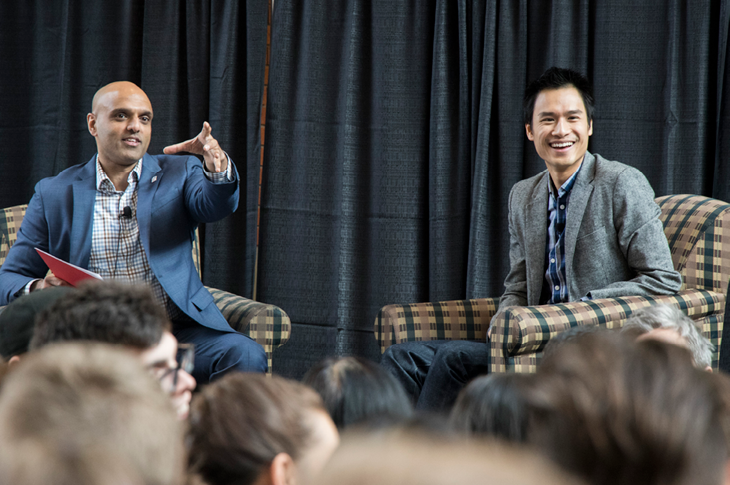Eating up the competition

If you're going to build something, make sure it's 10 times better than what's already out there — so says one of the co-founders of the wildly popular food delivery app, SkipTheDishes.
"Then take the leap. Go and do it," says Andrew Chau.
Speaking to students and staff as part of the SAIT School of Business' speaker series, Chau outlined the challenges, rewards and experiences of running a start-up — offering guidance to the young entrepreneurs in the audience.
His advice has been honed from years working in the competitive app industry — adjusting and adapting to changes in the market. After creating SkipTheDishes and working hard to make it grow to be a top app in the ever-grossing area of food delivery, he and his colleagues sold it to Just Eat in 2016 for more than $200 million. The time from startup to sale, though, saw large shifts between the original concept and what Skip would ultimately become.
"When you're starting up, odds are the idea you have now isn't going to be the idea you have in six months, 12 months or 2 years from now," says Chau, adding just because ideas change, it doesn't mean you aren't making progress.
"When we decided we wanted to transition from an ordering service to a delivery service, they were completely different businesses. That didn't stop us though."
Scaling success
The biggest transition point for Skip wasn't a single event, but in actuality, an accumulation of all the small successes and pitfalls — every win and each loss built the company, Chau says. The size of the wins and losses grew with the company.
"Every yes from a restaurant that signed up with us felt like the greatest thing in the world. Of course, when compared to when we signed McDonald's and launched 3,000 locations across Canada, it was on a much different scale."
The important thing, Chau says, is to ensure you don't take anything for granted. Every little move and change has an impact on where the company goes in the future.
Of course, Chau and his team faced their share of challenges as they built Skip. But focusing on how he would look back on this time gave him a good perspective.
"You only get one life — when I get older, what do I want to say I've accomplished? What type of impact do I want to have had? That's what got me past all of the no, no, no," says Chau.
Go with who you know
Looking back, Chau says the first 30 to 40 employees of Skip were ones he met through university and the clubs he participated in during his time at school. Not once did they hire someone they didn't know.
"Those connections you make while you're participating in business cases and clubs like Enactus will serve you well down the road," says Chau, adding it might not be clear at the time how beneficial hanging out with fellow students can be.
Chau encourages future entrepreneurs to keep pushing forward, even in uncertainty.
"Not doing anything is worse than trying to incrementally make changes," he says as a final piece of advice.
"Be the leaders of change."
Industry Driven
We prepare students for successful careers and lives.
SAIT'S
2020-2025
Strategic plan

Oki, Âba wathtech, Danit'ada, Tawnshi, Hello.
SAIT is located on the traditional territories of the Niitsitapi (Blackfoot) and the people of Treaty 7 which includes the Siksika, the Piikani, the Kainai, the Tsuut’ina and the Îyârhe Nakoda of Bearspaw, Chiniki and Goodstoney.
We are situated in an area the Blackfoot tribes traditionally called Moh’kinsstis, where the Bow River meets the Elbow River. We now call it the city of Calgary, which is also home to the Métis Nation of Alberta.